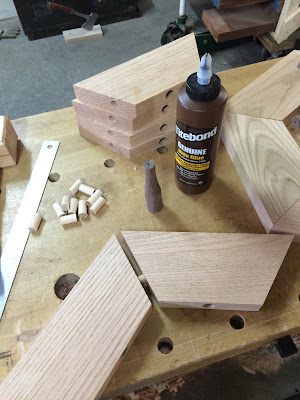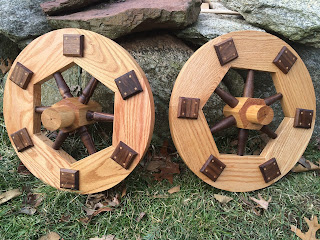
I was finally able to buy turning tools from payment of the last commissioned work I completed. (all my tools are wood project funded by choice) I also wanted to continue to incorporate lathe work in my projects, as I have done some in the past with borrowed tools.
Having been intrigued for years by wheel-wright work and wooden wheels in general, I set out to make an all wood wheel. I want it as strong as possible, being a functional useful part of a tool, such as a wheel-barrow.
Being a total novice at wheel making, I am attempting to balance functionality with aesthetics. The first step was to design a wheel template: I sat down with a compass, dividers, ruler and sharpened pencil.
I chose an 8" radius, for a 16" wheel. An 8" radius ends up working nice for layout, since with 6 segments, or felloes, each will have a corresponding length of 8".
I had some chunks of Hickory left over from my dining room table to use for the hub, so that's where I started.
 |
| I made sure of sharpness before attempting to plane hickory |
 |
| My sharpening set-up. A YouTube video by woodworker Paul Sellers turned me on to this. Works great, and simple to use. |
 |
| Squaring Hickory hub sections. |
 |
| Glue-ups complete, done for the night. |
 |
| Working down to the six sides with a draw knife and hatchet. |
 | |
| Axle hubs cleaned up and ready |
 |
| Felloes made and sized to template. I had enough Red Oak cut-offs to make 12, in two different thicknesses, for two wheels. |
 |
 |
| Trimming Felloe ends |
 |
| Quick jig made to facilitate drilling end grain of Felloe ends at 90 degrees. |
 |
| A quick improvement to my old lathe was a live center which has a bearing instead of a non-rotating dead center. The dead center had a point that overheated easy, especially with heavier turnings. |
 |
| Using a through hole in a scrap board and a Forstner bit to mark centers on dowel stock, which will be used for the wheel spokes. |
 |
| After Hickory, Walnut was a pleasure to turn. |
 |
| Spokes temporarily installed |
 |
| Adding alignment pegs to one side of each Felloe, which will also lend some additional strength. |
 |
| Glued and flattened wheel on a jig, which is really just a hole cut in a pine circle I had. |
 |
| Wheel circumference cut, smoothed with a freshly sharpened spoke shave. |
 |
| Noticed a splintered void that I cut into that needs repair |
 |
| Wheel damaged section planed smooth, with a scrap piece grain-matched to wheel, and glued overnight. Found the actual piece that splintered out after I was done for the night. Oh well. |
 |
| Squaring and chamfering felloe straps |
 |
| Gluing and pegging straps |











A true craftsman, as always great thought and detail in your pieces.
ReplyDelete